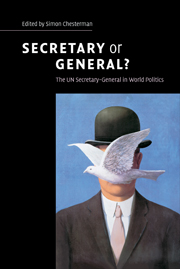Book contents
- Frontmatter
- Contents
- Contributors
- Foreword
- Acknowledgements
- Introduction: secretary or general?
- PART I Defining and refining the job description
- PART II Maintaining peace and security
- PART III Normative and political dilemmas
- PART IV Independence and the future
- APPENDIX: selected documents on the Secretary-General
- 1 Charter of the United Nations, 26 June 1945
- 2 Report of the Preparatory Commission of the United Nations, 23 December 1945
- 3 General Assembly Resolution 11(I), 24 January 1946
- 4 The “Wisnumurti Guidelines” for Selecting a Candidate for Secretary-General, 12 November 1996
- 5 General Assembly Resolution 51/241, 22 August 1997
- 6 Canadian Non-Paper on the Process for the Selection of the Next Secretary-General, 15 February 2006
- 7 General Assembly Resolution 60/286, 8 September 2006
- Select bibliography
- Index
1 - Charter of the United Nations, 26 June 1945
Published online by Cambridge University Press: 06 January 2010
- Frontmatter
- Contents
- Contributors
- Foreword
- Acknowledgements
- Introduction: secretary or general?
- PART I Defining and refining the job description
- PART II Maintaining peace and security
- PART III Normative and political dilemmas
- PART IV Independence and the future
- APPENDIX: selected documents on the Secretary-General
- 1 Charter of the United Nations, 26 June 1945
- 2 Report of the Preparatory Commission of the United Nations, 23 December 1945
- 3 General Assembly Resolution 11(I), 24 January 1946
- 4 The “Wisnumurti Guidelines” for Selecting a Candidate for Secretary-General, 12 November 1996
- 5 General Assembly Resolution 51/241, 22 August 1997
- 6 Canadian Non-Paper on the Process for the Selection of the Next Secretary-General, 15 February 2006
- 7 General Assembly Resolution 60/286, 8 September 2006
- Select bibliography
- Index
Summary
Charter of the United Nations, 26 June 1945
CHAPTER III – ORGANS
Article 7
There are established as the principal organs of the United Nations: a General Assembly, a Security Council, an Economic and Social Council, a Trusteeship Council, an International Court of Justice, and a Secretariat.
Such subsidiary organs as may be found necessary may be established in accordance with the present Charter.
CHAPTER XV – THE SECRETARIAT
Article 97
The Secretariat shall comprise a Secretary-General and such staff as the Organization may require. The Secretary-General shall be appointed by the General Assembly upon the recommendation of the Security Council. He shall be the chief administrative officer of the Organization.
Article 98
The Secretary-General shall act in that capacity in all meetings of the General Assembly, of the Security Council, of the Economic and Social Council, and of the Trusteeship Council, and shall perform such other functions as are entrusted to him by these organs. The Secretary-General shall make an annual report to the General Assembly on the work of the Organization.
Article 99
The Secretary-General may bring to the attention of the Security Council any matter which in his opinion may threaten the maintenance of international peace and security.
Article 100
In the performance of their duties the Secretary-General and the staff shall not seek or receive instructions from any government or from any other authority external to the Organization. They shall refrain from any action which might reflect on their position as international officials responsible only to the Organization.
Each Member of the United Nations undertakes to respect the exclusively international character of the responsibilities the discharge of their responsibilities.
- Type
- Chapter
- Information
- Secretary or General?The UN Secretary-General in World Politics, pp. 241 - 242Publisher: Cambridge University PressPrint publication year: 2007
- 1
- Cited by



